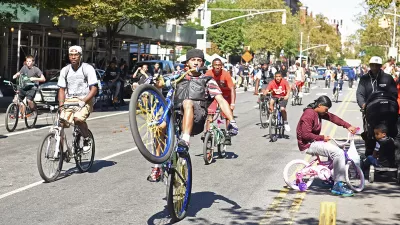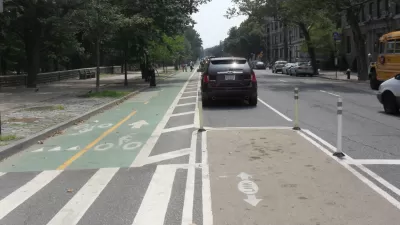Cities and companies are catching on to the economic impact of expanding bicycling amenities, writes Carolyn Szczepanski, who shares the growing body of research and anecdotal examples of the attraction between bikes and businesses.
"Increasingly leaders in the public and private sector are realizing that being bike-friendly makes good business sense, boosting the bottom line and promoting community-wide economic development," says Szczepanski. "Bicycling in the United States is a $6 billion national industry and one study estimates that the spillover effects of recreational bicycling alone could be as large as $133 billion. But that’s just the beginning, barely scratching the surface of the economic impact of transportation bicycling in communities across North America."
"Increasingly, businesses across the country are trying to tap into the spending power of cyclists. In 2008, the League of American Bicyclists launched its Bicycle Friendly Business (BFB) program, setting clear criteria for how employers can encourage cycling among their staff and customers and recognizing companies at the Bronze, Silver, Gold or Platinum level for their achievements. From small coffee shops to major corporations, a staggering 480 businesses in the US have earned a BFB designation. Hundreds more have applied."
"Even city officials and transportation planners are recognizing that the small cost of bike infrastructure provides a big payoff for taxpayers and business owners," she explains.
FULL STORY: How Bicycles Bring Business

Planetizen Federal Action Tracker
A weekly monitor of how Trump’s orders and actions are impacting planners and planning in America.

San Francisco's School District Spent $105M To Build Affordable Housing for Teachers — And That's Just the Beginning
SFUSD joins a growing list of school districts using their land holdings to address housing affordability challenges faced by their own employees.

The Tiny, Adorable $7,000 Car Turning Japan Onto EVs
The single seat Mibot charges from a regular plug as quickly as an iPad, and is about half the price of an average EV.

Seattle's Plan for Adopting Driverless Cars
Equity, safety, accessibility and affordability are front of mind as the city prepares for robotaxis and other autonomous vehicles.

As Trump Phases Out FEMA, Is It Time to Flee the Floodplains?
With less federal funding available for disaster relief efforts, the need to relocate at-risk communities is more urgent than ever.

With Protected Lanes, 460% More People Commute by Bike
For those needing more ammo, more data proving what we already knew is here.
Urban Design for Planners 1: Software Tools
This six-course series explores essential urban design concepts using open source software and equips planners with the tools they need to participate fully in the urban design process.
Planning for Universal Design
Learn the tools for implementing Universal Design in planning regulations.
Smith Gee Studio
City of Charlotte
City of Camden Redevelopment Agency
City of Astoria
Transportation Research & Education Center (TREC) at Portland State University
US High Speed Rail Association
City of Camden Redevelopment Agency
Municipality of Princeton (NJ)




























